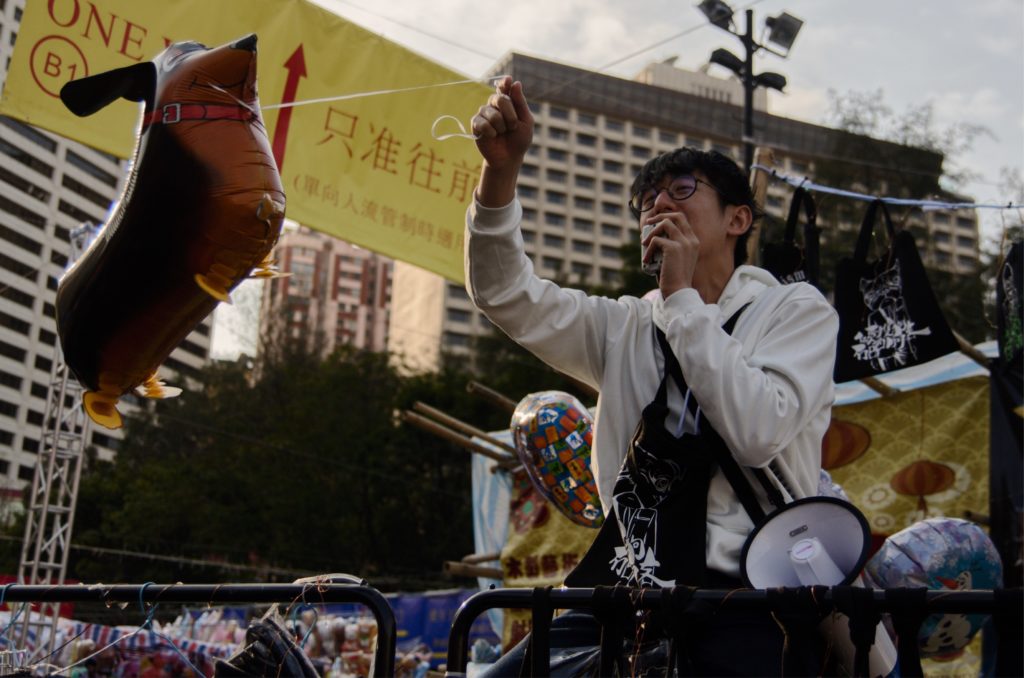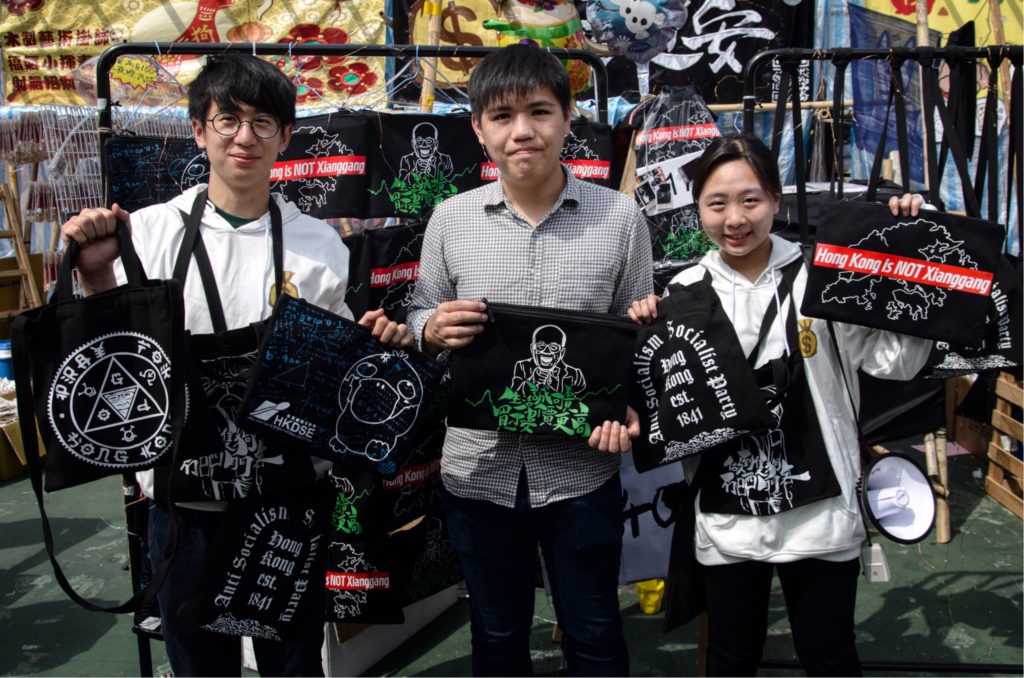The images of the Umbrella Movement have circulated around the world – but since then Hong Kong has disappeared from the focus of the world stage. Did the situation improve since then? No, to the contrary. The activists from Meta Hong Kong are not prepared to accept this and are campaigning for a more democratic and social Hong Kong.
By Anja Meunier / 16.4.2018
“Hong Kong is not Xianggang! Support us! Hong Kong is not Xianggang!” the voice repeats over and over again through the megaphone at the Chinese New Year’s Fair in Hong Kong’s Victoria Park. Francis Cheong and Dennis Shun are standing amongst the Meta Hong Kong student group, trying to engage with the visitors and raise awareness of the various political issues. They are selling bags and t-shirts with cartoons and slogans on them criticising social wrongs and China’s growing involvement in the autonomous region.
Francis explains the meaning of the phrase “Hong Kong is not Xianggang“. “The original name of this city is Hong Kong, but if you look at a map from China you will sometimes see the name Xianggang, a different romanisation and pronunciation. But if you pronounce Hong Kong as Xianggang, then it’s just a simple Mandarin word and it will lose the meaning Hong Kong.” The name Hong Kong also stands as a symbol of political and cultural independence. “China has a lot of influence in Hong Kong, so we hope these products can raise awareness.”

“Hong Kong is not Xianggang!”, Francis shouts through the megaphone. © Anja Meunier
In the years prior to the changeover of Hong Kong from the former British colony to China in 1997, at first many residents were worried about the preservation of their freedoms. Restrictions on the freedom of speech, press and public gatherings were greatly feared. This wasn’t initially the case. After being handed over to China, Hong Kong was granted the status of Special Administrative Region and Hong Kong’s political independence was guaranteed under the principle of “One Country, Two Systems”.
However, after a long period of real autonomy, the Chinese government began a gradual process of realignment and influence. In Hong Kong, the so-called Basic Law, the constitution of Hong Kong, applies. However, in cases of uncertainty, the Chinese People’s Congress has the opportunity to decide on the interpretation of these laws. This can be done on the initiative of the Hong Kong government, the highest Hong Kong court or the People’s Congress itself. “In the past this system was seldom used, because we also have the Court of Final Appeal. Usually the problem could be settled there. But recently, the Chinese government has proactively used this system to interpret the Basic Law,” explains Francis. “This really makes our new generation fear for Hong Kong’s future. Do we still possess autonomy?”
When China’s national curriculum was about to be introduced in Hong Kong in 2012, this led to demonstrations by the student and school pupil populations, led by Joshua Wong, who was only 14 years old at the time. The occupation of the Civic Square eventually caused the government partially to capitulate. Schools ought to be given the right to choose the curriculum they want to teach.
The last major wave of protests hit Hong Kong in 2014, following the decision by the Chinese National People’s Congress to allow only a selection of candidates run for election for the Hong Kong Chief Executive post, which was audited by a Chinese committee. At first, about 5,000 students protested outside the government headquarters; of which about 100 stormed the Civic Square once again on September 26th, led by then 16-year-old Joshua Wong. However after tough police intervention – most notably the use of tear gas on peacefully demonstrating students – thousands more joined in solidarity with the demonstrators. This culminated in up to around 100,000 protesters. The students occupied the Central district for weeks. The images circulated around the world and became known as the Umbrella Movement – with the umbrella as the symbol of peaceful resistance to tear gas. The siege finally ended with no clear result on 15th December as the police cleared the site.
Were the protests a success? “In some way they were very successful. The news was reported by many media outlets around the world, creating international awareness and increasing pressure to the Chinese government to give more freedom to the people of Hong Kong. In this part I think Joshua Wong was successful,” says Dennis. The protests have created an awareness of the problem not only internationally. In December 2017, in a survey by the University of Hong Kong, of 134 people aged 18-29 69.7% answered, that they regard themselves Hongkongers, as opposed to Chinese. In mid-2014, before the student protests, the results only showed 53.1%. However, apart from an increased awareness of the problem, the movement has achieved nothing, says Francis. “If you talk about what it has really successfully achieved, meaning, is the influence from China reduced, then no, it wasn’t successful. The influence from the Chinese government is just increasing.”
The students have other ideas to just protesting and conflicts. “When we started our group Meta Hong Kong we had a thought. The political problems in Hong Kong cannot be solved by political means,” recalls Francis. “When the Chinese government visits Hong Kong, the first people they meet with is not the Hong Kong government. It’s the tycoons, the rich people. In Hong Kong, the rich have greater power than the government. So, our dream would be to become a big company, to let economic power become our bargaining power. But I think this is far away…”

Francis and Dennis with their colleague Prudence in front of the Meta Hong Kong stand. © Anja Meunier
Currently, the focus is still on conversation and persuasion. “At this New Year’s fair, we try to reach different generations. Many people will come here, older generations, as well as people like us,” explains Dennis. “We try to get chatting with other people, explain what we are thinking and try to make them understand the importance of keeping our own culture and not being influenced by the Chinese government.”
But amidst the stands of mobile phone covers, cleaning supplies, flowers or sweets, only a few visitors are interested in the political message of the young activists. Francis criticises the lack of interest of the young citizens of Hong Kong. “They seldom read the news, they only like to study and find a good job and that’s it. This is their life. I think that is very sad,” he says. “On the other hand, older people often very strongly support the government, no matter what they do. If they decide ‘Hong Kong goes back to China’, they will just say ‘okay’. The government is just like God, and God cannot fail.”
The work of the activists is labour-intensive and often unsatisfying. In addition, political sentiment against China is dangerous, even in autonomous Hong Kong. “The Chinese government is very powerful. So it is very hard. The owner of a bookstore in Hong Kong, which sold books about independence and books criticising China, got disappeared. He got disappeared. Disappear should not be a passive word, but we have to say it like this,” says Francis. Additionally, hacker attacks on critical media are not uncommon in Hong Kong. However, the students at Meta Hong Kong have not experienced any reprisals themselves so far. “Because we are not famous now. If we become more famous, maybe the Chinese government will do something.”
How should it continue? “We need to think about that,” says Francis, “we just have to find a new way.” But one thing is for sure; giving up is not an option.





Recent Comments